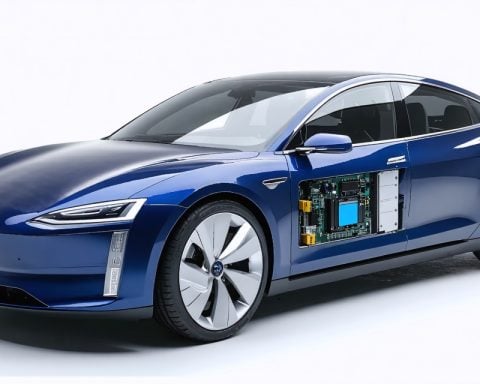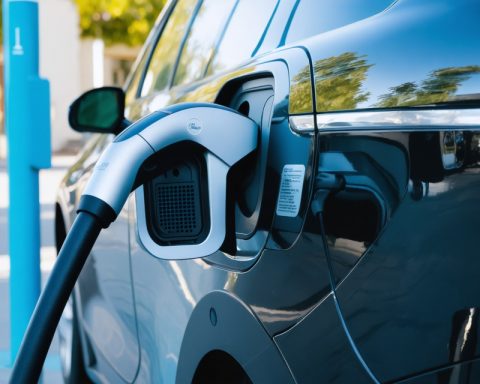As the automotive industry races towards electrification, BMW has unveiled an Advanced Battery Charging System that could redefine the standards of electric vehicle (EV) technology. This cutting-edge system promises not only to enhance charging efficiency but also to extend battery life, providing a glimpse into the future of sustainable driving.
At the core of this breakthrough is an innovative algorithm that optimizes the charging process by dynamically adjusting the current and voltage based on real-time battery conditions. This adaptive charging technology minimizes heat generation, reduces wear, and significantly cuts down on charging times without compromising safety or battery integrity.
BMW’s Advanced Battery Charging System is also set to integrate with smart grid technology, enabling vehicles to become more than just a mode of transport. By communicating with power suppliers, the system can charge during off-peak hours, thus reducing energy costs and easing the load on energy infrastructures. This makes the BMW charging system not only car-friendly but also environmentally responsible.
Moreover, the system supports future-proofing by being compatible with upcoming battery chemistries, offering unparalleled versatility. With BMW’s advanced solution, drivers can anticipate longer road times and quicker pit stops, setting the stage for an electrifying driving experience.
As EV adoption accelerates globally, BMW’s Advanced Battery Charging System positions itself as a pivotal player in the next generation of automotive innovation. The future is not just fast; it’s efficiently charged and roaring to go.
Revolutionizing Electric Vehicle Charging: BMW’s Leap Towards a Sustainable Future
The unveiling of BMW’s Advanced Battery Charging System represents a significant milestone in the greening of the automotive industry, with profound implications for the environment, humanity, and the global economy. As transportation is one of the largest sources of greenhouse gas emissions, this advancement could play a critical role in reducing humanity’s carbon footprint, aiding in the fight against climate change.
Environmental Impact
The introduction of adaptive charging technology stands to transform the environmental landscape by minimizing energy waste and heat generation during the charging process. This efficiency means less energy consumption for each mile driven, directly reducing emissions from power plants, especially if integrated with renewable energy sources. Furthermore, the system’s ability to integrate with smart grid technology allows for optimized charging schedules, meaning EVs will charge primarily when renewable energy production is at its peak or during off-peak hours, thus reducing reliance on fossil fuels.
The support for future battery chemistries also underscores a commitment to reducing the environmental impact of EVs. As battery technology evolves, including advancements in solid-state or silicon-dominant batteries, cars equipped with adaptive systems like BMW’s will be ready to utilize these less environmentally detrimental technologies from day one.
Impact on Humanity
The enhanced efficiency and reduced charging times promise to make EVs more accessible and attractive to a broader audience. As range anxiety and long charging times are significant deterrents in EV adoption, systems that address these issues will likely accelerate the transition from internal combustion engines to electric drivetrains. This shift could lead to cleaner air in urban areas, directly improving public health by reducing airborne pollutants.
Additionally, the integration with smart grids exemplifies the potential for vehicles to play an active role in energy management, inspiring a new relationship between humanity and our infrastructure. This symbiosis could lead to more resilient energy systems, particularly in developing regions where energy stability is a challenge.
Economic Implications
Economically, the advancements presented in BMW’s system could lead to cost savings for consumers due to reduced electricity costs from smart charging habits and decreased maintenance needs owing to extended battery life. For the automotive industry, it lays the groundwork for broader EV adoption, pushing economies to invest in cleaner technologies and infrastructure.
Furthermore, as vehicles become more integrated into energy systems through smart grids, there is potential for new markets and jobs in technology development, grid management, and EV maintenance sectors. These developments could spur economic growth and support the transition to a sustainable energy future.
Connections to the Future of Humanity
As humanity faces the challenges of climate change and depleting natural resources, transitioning to sustainable transport systems is not just advantageous; it is essential. BMW’s Advanced Battery Charging System is a step toward that future, where innovation meets necessity. The efficiency and adaptability of such systems will be critical in a world where energy conservation and sustainability become increasingly vital for survival.
In summary, BMW’s Advanced Battery Charging System does more than enhance the driving experience; it positions electric vehicles as a cornerstone of sustainable living and a cleaner, greener future for the next generation. This reinforces the notion that progress in technology can lead to transformative societal benefits, essential for long-term global resilience and prosperity.
Revolutionizing EVs: BMW’s Advanced Battery Charging System Sets New Standards
As the automotive industry continues its accelerated transition towards electrification, BMW has emerged as a key innovator with the unveiling of its Advanced Battery Charging System. This groundbreaking development promises to redefine the expectations for electric vehicle (EV) technology, with its potential to enhance charging efficiency, extend battery life, and support a more sustainable driving future.
Key Features and Innovations
BMW’s revolutionary system introduces several state-of-the-art features that set new benchmarks in the EV market:
– Adaptive Charging Technology: At the heart of the system is a sophisticated algorithm that dynamically adjusts current and voltage based on real-time battery conditions, minimizing heat and wear. This results in reduced charging times without compromising battery safety or integrity.
– Smart Grid Integration: By enabling communication with power suppliers, BMW’s system allows vehicles to charge during off-peak hours, lowering energy costs and easing infrastructural load. This integration supports both user convenience and environmental responsibility.
– Future-Proof Compatibility: The system is designed to be compatible with upcoming battery chemistries, ensuring longevity and adaptability to future advancements in battery technology.
Market Implications and Controversies
As the demand for sustainable and efficient transportation solutions grows, BMW’s Advanced Battery Charging System positions itself at the forefront of automotive innovation. However, some industry insiders have expressed concerns regarding the widespread integration of smart grid technology and potential privacy issues related to data sharing between vehicles and power suppliers.
Competitive Advantages
Compared to existing charging systems, BMW’s solution offers:
– Reduced Charging Time: Significantly faster charging speeds without harming battery longevity.
– Enhanced Energy Management: Through smart grid integration, it optimizes energy use, reflecting in lower energy bills for consumers.
– Sustainability Focus: By promoting off-peak charging, it plays a crucial role in reducing emissions and supporting cleaner energy usage.
Predictions and Future Insights
The unveiling of BMW’s Advanced Battery Charging System is timely as EV adoption is accelerating globally. The system is anticipated to become a pivotal player in the next generation of automotive innovation. Analysts predict that as more manufacturers embrace similar technologies, the market will witness a substantial shift towards more efficient and environmentally friendly EV solutions.
User Reviews and Feedback
Initial feedback from early adopters highlights the system’s time-saving features and environmental benefits. Many users have noted the convenience of smart grid integration, aligning charging practices with individual energy conservation goals.
For more information on BMW’s innovative technologies, visit their official site.
By embracing adaptive and sustainable technologies, BMW is not just meeting the current demands of the electric vehicle market but is also paving the way for future innovations. This new charging system is more than a technological upgrade; it is a visionary leap towards a smarter and greener automotive future.













